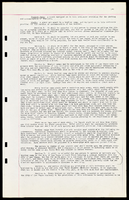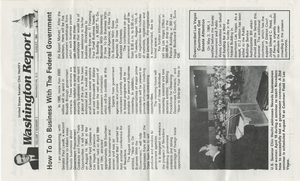Search the Special Collections and Archives Portal
Search Results
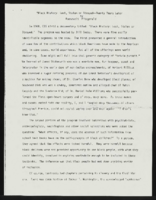
"Black History: Lost Stolen or Strayed -- Twenty Years Later": article draft by Roosevelt Fitzgerald
Date
Archival Collection
Description
From the Roosevelt Fitzgerald Professional Papers (MS-01082) -- Drafts for the Las Vegas Sentinel Voice file. On Black reality not significantly improved 20 years later.
Text
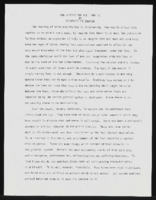
"And Justice for All: Part II": article draft by Roosevelt Fitzgerald
Date
Archival Collection
Description
From the Roosevelt Fitzgerald Professional Papers (MS-01082) -- Drafts for the Las Vegas Sentinel Voice file. On Native Americans being robbed/exterminated
Text

Angela Castro oral history interview: transcript
Date
Archival Collection
Description
Oral history interview with Angela Castro conducted by Stefani Evans, Cecilia Winchell, Kristel Peralta, Vanessa Concepcion, and Ayrton Yamaguchi on November 05, 2020 for the Reflections: The Las Vegas Asian American and Pacific Islander Oral History Project. Castro begins the interview by talking about her early life, childhood, what Guam was like, and the history of her parents and grandparents. She describes the difference in public and private education in Guam and compares it to the United States. She explains the reason why she moved to Las Vegas, Nevada in 1998 and attended the University of Nevada, Las Vegas for public relations. Castro then talks about the differences between older and newer generations, the political atmosphere in Guam, and the differences between the United States and Guam in politics. She also talks about the discrimination she has experienced throughout her life and diversity in the workplace. Lastly, she describes her culture and traditions during holidays, the struggles with an absence of culture within her family, and her personal religious beliefs.
Text

Transcript of interview with Eva Garcia Mendoza by Elsa Lopez and Barbara Tabach, September 25, 2018
Date
Archival Collection
Description
On the corner of 7th street and Clark, and beside the tennis courts of Las Vegas Academy, stands the law office of attorney Eva Garcia Mendoza. Eva has worked in her office since 1982, and in this time she has helped the Las Vegas community work through civil and immigration cases besides aiding in a myriad of other ways. Eva Garcia Mendoza was born in 1950, in the town of McAllen, TX-an environment that perpetuated hatred of Mexican Americans. Eva recalls the racism she endured; for instance, being spanked if she spoke Spanish in school, and her family facing job discrimination because of her skin color or her last name. Being an ethnic and financial minority was difficult, and Eva remembers nights as a child when she would cry herself to sleep. Eva showed resilience in the face of adversity as she states, “you rise to the level of your teachers’ expectations.” With the encouragement of her band professor, Dr. L.M Snavely, she began higher education at Pan American College. She moved to Las Vegas in 1971 and began to work before being accepted at UNLV to study Spanish literature. She graduated in the class of 1973. In 1975, Eva applied to become a court interpreter, a decision that would drastically change the trajectory of her career. She earned the coveted position and began to work beside Judge John Mendoza who was the first Latino elected to public office in the state of Nevada. Several years later John and Eva would wed. Judge Mendoza passed away in 2011. Eva talks about how extraordinary his legacy is-from his professional achievements to a story about his v football days and the 1944 Dream Team, this true story even piqued the interest of Hollywood writers. Through her work, Eva began to notice how she was more than qualified to become a lawyer herself, so she applied and gained a full ride scholarship to the Law School of San Diego University. Eva describes the struggles of attending school in San Diego while her spouse and children were home in Las Vegas. Despite the financial difficulties, being one of few minority students, and becoming pregnant her second year, Eva was able to finish her remaining university credits by returning to Las Vegas and working with Judge Mendoza. Together, they started the Latin Bar Association. Eva began her own practice in 1981 and would later partner with Luther Snavely, who was the son of her band teacher that helped her to attend college so many years back. Today, Eva has a new partner at her office and hired her son to work as a secretary. Eva also tells of the office’s mysterious history, of which includes a ghostly figure many clients claimed to have seen in the reception room. Eva recounts many of her professional achievements, such as petitioning to start the American Immigration Lawyers Association, Nevada Chapter, representing celebrities, winning the unwinnable cases such as against the Nevada Test Site. Eva talks about current events, such as today’s immigration laws, the discriminatory practices of revoking birth certificates from those born in Brownsville, TX., and about the importance of the #MeToo movement. Eva and her family have a great fondness for Las Vegas. The support for the Latinx community in Las Vegas greatly contrasts that which she experienced as a child in southern Texas. She describes wanting to take her children and grandchildren to visit her old home in McAllen, TX where her family grew up on the “wrong side of the tracks.”
Text
Nittaya Parawong oral history interview
Identifier
Abstract
Oral history interview with Nittaya Parawong conducted by Cecilia Winchell, Stefani Evans, and Jerwin Tiu on March 17, 2022 for Reflections: The Las Vegas Asian American and Pacific Islander Oral History Project.
In this interview, Nittaya Parawong discusses her upbringing in Northeastern Thailand, her parents' restaurant and family recipes, and her business education in Bangkok, Thailand as a teenager. Wanting more than a corporate lifestyle, Parawong decided to immigrate to the United States, briefly living in Orlando, Florida before moving to Las Vegas, Nevada. She recalls bussing tables at a local Thai restaurant and attending English classes at College of Southern Nevada (CSN) before opening her own restaurant, Jasmine Thai Gourmet, at the age of 25. Now, Parawong is the owner of Nittaya's Secret Kitchen, Nittaya's Little Kitchen, and Block9 Thai Street Eats in Las Vegas. She shares memories and traditions of Thai celebrations, her views on Buddhism, personal cooking philosophy, and restaurant offerings.
Archival Collection
Ruthe Deskin oral history interview
Identifier
Abstract
Oral history interview with Ruthe Deskin conducted by Anthony Ferri on April 17, 2000 for the Communication and Community in Las Vegas research study. In this interview, Deskin talks about her upbringing in Yerington, Nevada, her degree in journalism from the University of Nevada, Reno (UNR), and her permanent move to Las Vegas, Nevada in 1945. She discusses her early jobs working for KENO and KLAS radio stations as an advertising and continuity editor, her public relations work for the Last Frontier Hotel, and then starting what would become her life work with Hank Greenspun's Las Vegas Sun newspaper in 1954. Later, she talks about her column "Memo to Hank" and Greenspun's "Where I Stand" column, about how Las Vegas changed over her fifty year tenure at the newspaper, politicians, racial inequality, and highlights of her career.
Archival Collection
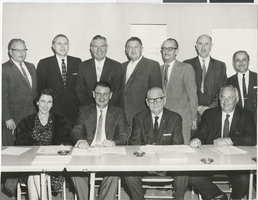
Photograph of Regents, Las Vegas, 1950s - 1960s
Date
Archival Collection
Description
Image


